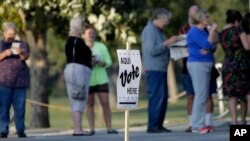The U.S. Supreme Court will begin hearing arguments Tuesday in a voting rights case over the constitutional requirement to make electoral districts roughly equal in population.
A decision by the court could test the framework of the so-called "one person, one vote" principle that has defined political boundaries for decades.
In Texas, two voters challenged the way the state draws its senate districts. Sue Evenwel and Edward Pfenninger highlighted the difference in eligible voters in the mainly rural districts outside Houston, Texas, where they live, and those in a downtown Houston district with equal population, but at least 170,000 fewer eligible voters.
Evenwel and Pfenninger said the state Senate redistricting map signed into law in 2013 did not equally distribute voters, improperly inflating the voting power of urban areas and giving them more sway in dictating the outcome of elections.
Conservative groups have said the current system distorts the rights of non-voters in the democratic process, particularly in states such as California, Texas and Florida, where larger numbers of non-citizen immigrants live and are counted in the census figures.
They have challenged the premise based on a simple argument that counting overall population, including those ineligible to vote, unfairly diminishes the power of citizens who are eligible to vote.
They have urged the Supreme Court to invalidate the current system, which would force states to completely redraw local and state political districts using different factors and perhaps open the door to eventually reconfiguring congressional districts.
Experts predict the Supreme Court is unlikely to back such a dramatic overhaul, but they believe overturning Texas' system would trigger a radical political change nationwide, likely shifting more political power in some states from urban centers to rural areas.
"If the court sides with Texas and keeps the status quo, it's no big deal," said Rick Hasen, a University of California at Irvine law professor. "But it would be a huge deal if the court goes the other way."
Latinos, fairness and partisanship
Latino advocacy groups worry that changes to local political boundaries would be unfair in areas where non-citizen immigrants might not get equal treatment from their elected lawmakers.
"Texas has a history — a shameful, disgraceful history — of discrimination against Latinos for over 150 years," said Dallas Immigration Attorney Domingo Garcia.
With the U.S. presidential election less than a year away, the backdrop of voting rights has created a political battle between Republicans and Democrats.
At issue are voting regulations from the Supreme Court's 2013 ruling gutting key provisions in Section 5 of the Voting Rights Act. The decision removed the requirement that states with a history of voting discrimination — like Texas — had to get. Those states had been required pre-clearance from the U.S. Justice Department before being allowed to make changes to election laws, including the redrawing of political boundaries.
There are also court challenges in several states to enact stricter voter identification laws that critics say unfairly target minority voters inclined to vote for Democratic candidates.
"Partisan politics plays a big role in the debate," said James Henson, Director of the Texas Politics Project at the University of Texas in Austin.
"In public opinion surveys, we found the Democrats support reinstating Section 5 of the Voting Rights Act,” he said. “On the other hand, Republicans were largely opposed the enforcement provision.
"Voting rights cases have become a partisan issue like so many other things, and now we see the party polarization like we see in so many other areas in politics."





